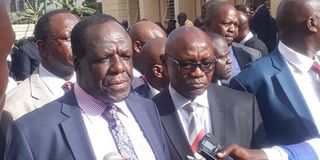Lake Region counties vow to work closely with national govt

Lake Region Economic Bloc Chairman Wycliffe Oparanya (left) addresses journalists outside Busia County Assembly on March 20, 2018. He said the bloc is keen to work in collaboration with national government. PHOTO | GAITANO PESSA | NATION MEDIA GROUP
What you need to know:
- The regional bloc has announced plans to channel resources towards improving the existing road network and maritime transport.
- The bloc is also keen on embarking on combating the effects of climate change.
- Mr Ongwae reiterated the need to finalise the bloc’s bank project.
Governors from 14 counties comprising the Lake Region Economic Bloc (Lreb) have vowed to work closely with the national government to improve key shared resources in the region for the benefit of over 16 million residents.
Led by Lreb Chairman Wycliffe Oparanya, the governors were in Busia County on Wednesday where they addressed the county assembly on the progress made so far by the bloc.
The regional bloc has announced plans to channel resources towards improving the existing road network and maritime transport in Lake Victoria in order to improve connectivity in the region after ratification of the regional bank project set to become operational after Busia County Assembly adopted the Lreb Bill, 2018 early this month.
AGRICULTURE
Other sectors targeted by the governors under the regional bloc include agriculture where the counties are keen on reviving the once robust sugar, cotton, coffee, dairy and fish sub-sectors.
“Our region is strategically placed to serve as a gateway to East and Central Africa and we also share a large water body in Lake Victoria which serves around 44.9 million people in Kenya, Uganda, Rwanda and Tanzania,” Mr Oparanya said.
Others governors present were James Ongwae (Kisii), Anyang’ Nyong’o (Kisumu) and host Sospeter Ojaamong.
“The implementation of these projects will include jointly setting aside land for development of industrial cities, modernised workforce and landing bays, development of inter-county road circuits, refurbishing of ports, water hyacinth clearing and dredging of Lake Victoria,” Mr Oparanya said.
CLIMATE CHANGE
He added that apart from maritime transport, the bloc is also keen on embarking on combating the effects of climate change that continue to pose as a threat to population worldwide.
“We have identified restoration and conservation of our water catchment areas as another flagship project through development of a framework that will allow us to jointly manage water bodies including dams, rivers and lakes within the region,” he stated.
Mr Oparanya said the bloc will also invest in residents by empowering them to be more productive.
HEALTHCARE
“This can only be achieved by offering proper healthcare services and education. As the chair of Council of governors, [I] want to leverage on this by engaging the national government frequently so that enough resource are allocated to counties,” he said.
Prof Nyong’o said improved maritime transport offers a good opportunity to open up the regions’ economic fortunes once the infrastructure is in place.
“Since 1976, transport in the lake has gone down due to environmental degradation. We are working closely with the national government to dredge the lake that will be preceded by construction of 47km canal from Kisumu to Mbita in Homa Bay to enable big ships access the region,” said the Kisumu governor.
REGIONAL BANK
Mr Ongwae reiterated the need to finalise the bloc’s bank project which he said will play a vital role in unlocking the potential of the region through project funding and financial inclusion of communities in the region.
He urged counties that have not ratified the Bill to hasten the process to enable the bloc realise its objectives.
“As counties we have identified key areas that we believe will help address the health challenges in the region including medical conferencing that we are putting in perspective,” said the Kisii governor.




